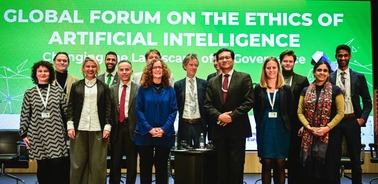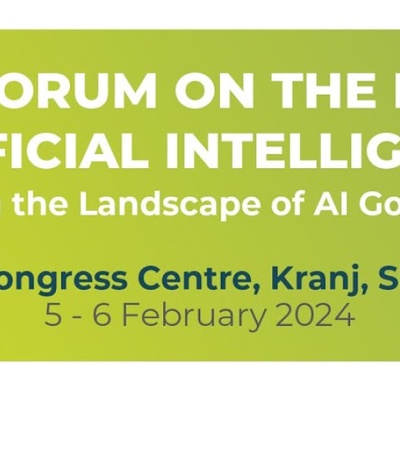Theodore Lechterman shares his views about the future of AI governance at the UNESCO Global Forum

Lechterman discussed IE University’s innovative approaches to enhance the participation of academia in the global debate, co-design and governance of AI. Photo: Ministry of Digital Transformation of Slovenia.
Theodore Lechterman, Assistant Professor of Philosophy at IE School of Humanities, participated last week in the Global Forum on the Ethics of Artificial Intelligence (AI). Hosted by the United Nations Educational, Scientific and Cultural Organization (UNESCO) in Slovenia, the Forum brought together the expertise of countries at different levels of technological and policy development, for a focused exchange to learn from each other, and for a dialogue with the private sector, academia and a wider civil society.
The annual Forum addresses how to advance the implementation of the UNESCO Recommendation on the Ethics of AI, widely considered to be the world’s most authoritative and philosophically rigorous framework for responsible AI. Many countries have embraced the Recommendation’s directive to leverage the benefits of AI while cautiously guarding against its risks. The event provides an opportunity to share emerging best practices and ongoing challenges.
One highlight of the event for Lechterman was participating in a panel discussion with global leaders from civil society and academia on how to shape an inclusive future for AI. Lechterman discussed IE University’s innovative approaches to enhance the participation of academia in the global debate, co-design and governance of AI.
“As an academic, I see AI ethics as a tremendous success story. AI ethics began with a set of concerns cultivated in academia, and it is now part of the global public agenda”.
Theodore Lechterman, Assistant Professor of Philosophy at IE School of Humanities
“But it is still essential to check back in with academia periodically to get new insights and new sources of criticism”, said Lechterman.
IE University recently launched the IE School of Humanities with UNESCO as collaborator. Lechterman elaborated on the cooperation between Global North and Global South, a pivotal aspect of their research cooperation, which aims to bolster the engagement of diverse stakeholders across various global regions.
“The idea of research is changing. IE University has partnered with universities in Africa and South America to connect researchers from different regions. Exchanging people’s ideas and resources across different countries is one key we can think of bridging the global divide in AI governance”, concluded Lechterman.
